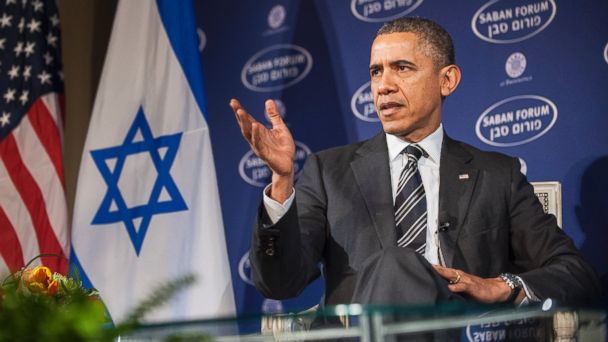President Obama Defends Iran Nuclear Deal to Israeli Policy Forum

(Credit: Pete Marovich/Getty Images)
WASHINGTON, D.C. - President Obama said today "We don't know yet" whether the agreement reached with Iran last month will succeed in keeping the country from producing nuclear weapons, but he asserted that there are "unprecedented" fail-safe mechanisms to keep the agreement from failing, as others have in the past.
The president defended the deal today at a Mideast policy conference, where he was asked what made the sweeping, if tentative pact - which Israel opposed - "different" from the failed nuclear agreements pursued by Presidents Reagan with Pakistan and Clinton with North Korea.
"Well, we don't know yet. We don't know yet." Obama said at the Brookings Institute's Saban Forum. "I think it's important for everybody to understand: This is hard, because the technology of the nuclear cycle you can get off the Internet. The knowledge of creating a nuclear weapon is already out there."
The president was responding to a question from the sit-down discussion's moderator, Haim Saban, and acknowledged there was a possibility Iran would renege on its side of the bargain, which was agreed to two weeks ago.
"Having said that, by the time we had gotten an agreement with North Korea they essentially already had a nuclear weapon. With respect to Pakistan there was never the kinds of inspection regimes and international sanctions and UN resolutions that have been in place," Obama continued, adding the failsafe mechanisms around the current deal were "unprecedented and unique" in diplomatic history.
Iran Checklist: What Needs To Happen (and What Could Go Wrong)
The Saban Forum leans heavily toward Israeli policy and comes amid tension between Washington and Tel Aviv over the deal. At the time the deal was signed, Prime Minister Benjamin Netanyahu, who is scheduled to speak at the forum by satellite on Sunday, called it a "historic mistake" and one that made the world a "much more dangerous place."
Critics in the U.S. and Israel have said Tehran could use the six-month agreement, in which the U.S. eases some economic sanctions while the Mideast state pauses its nuclear program, to buy time. Further the endgame of the agreement, if successful, would allow Iran to retain a nuclear energy program with low uranium enrichment levels for power plants. But skeptics fear even that infrastructure could be rapidly modified to produce weapons-grade product - what is called "breakaway" capability.
"If we could create an option in which Iran eliminated every single nut and bolt of their nuclear program, and forswore the possibility of ever having a nuclear program, and for that matter got rid of all its military capabilities I would take it," Obama said. "But, Haim, I want to make sure that everybody understands that particular option is not available."
VIDEO: Iran Nuclear Deal Could Be Stalling Tactic for Long Term Negotiations
Obama also had cautious optimism for his Iranian counterpart, President Hassan Rouhani.
"Obviously Rouhani is part of the Iranian establishment and the - I think we have to assume that his ideology is one that is hostile to the United States and to Israel," he said. "But what he also represents is the desire on the part of the Iranian people for a change of direction. And we should not underestimate or entirely dismiss a shift in how the Iranian people want to interact with the world."
"We have to not constantly assume that it's not possible that Iran, like any country, can change over time," the president would later add.
Coincidentally, in Iran today Rouhani was himself defending the nuclear deal in a televised speech to university students. Rouhani has been trying to convince his own hardliners and critics that he is not yielding the Islamic state's sovereignty.
"Nuclear technology and uranium enrichment is our definite right," Rouhani said, according to The Associated Press. "But progress, better living conditions and welfare for the people is also our definite right. Breaking and dismantling the architecture of the ominous and oppressive sanctions is also our definite right."
Secretary of State John Kerry and Israeli Foreign Minister Avigdor Lieberman also spoke at the forum.
Meanwhile, Obama's discussion with Haim Saban also comes two weeks after the president attended a high-end Democratic fundraiser at Saban's Beverly Hills home. Saban, an Israeli-American media mogul and top-dollar donor for the party, hosted the fundraiser on Nov. 25, two days after the nuclear deal was struck in Geneva.